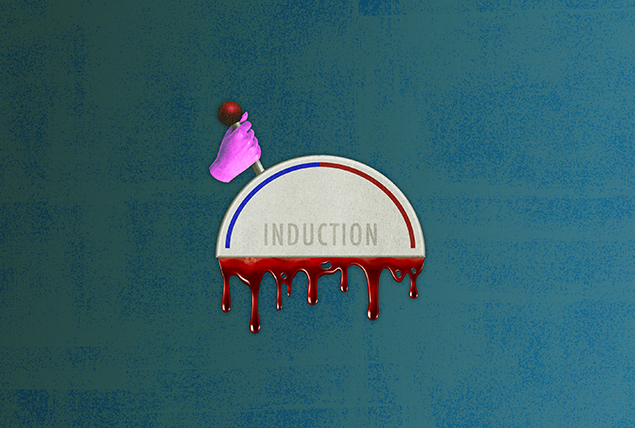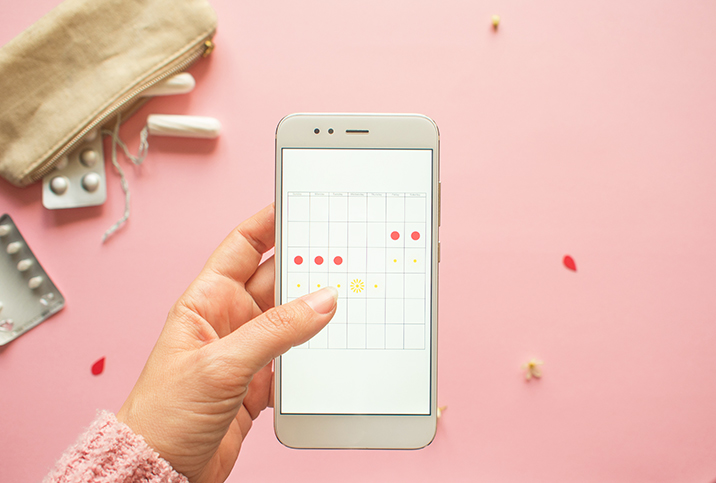Can You Really Induce Your Period?

If you have an upcoming vacation or wedding, wanting to delay your period is not an uncommon wish. However, you may have also wondered whether it's possible to bring your period earlier so you can be done with it. The thought of inducing your period may have also come up if you are concerned about delayed menses.
The internet is chock-full of ideas pertaining to how to do the same, from using pineapples to vitamin C and even having sex.
But is this possible, and if so, what works and which ones are myths? We chatted with experts to find out.
What methods actually work?
According to Kecia Gaither, M.D., board-certified in OB-GYN and maternal-fetal medicine and director of perinatal services/maternal-fetal medicine at NYC Health + Hospitals/Lincoln in the Bronx in New York City, if you are on oral contraceptives, you can get your period to come faster by switching to placebo pills sooner.
"There is no other scientifically noted method to do so," Gaither noted.
Dan Nayot, M.D., an OB-GYN and the chief medical advisor for Bird & Be fertility specialists in Toronto, concurred with Gaither.
"When we talk about periods, we talk about our hormones, and that would require manipulation to bring your periods early," Nayot said. "But in terms of diet, nothing works specifically. You cannot schedule your periods based on food, acupuncture or supplements, only hormones."
The myths and risks
While it might appear to some women that they get their period a day or two earlier than expected after having sex or an orgasm, this would not happen unless they were already due to have a period imminently.
"It has been hypothesized that the uterine contractions that occur with orgasm may expel the tissues lining the uterus, the menstrual blood, immediately following sex," said Julia Arnold VanRooyen, M.D., an OB-GYN in Wayland, Massachusetts. "However, this would not occur at the beginning of a menstrual cycle, for example, in the days immediately after a period."
Basically, it's a matter of timing during the cycle. Orgasms might seem to bring on a period, but only if you were due to have a period in the next day or so anyway.
In addition, pineapples, vitamin C, ginger, cumin and other natural foods are healthy to consume, but there is no scientific evidence that they can bring your period earlier.
As a matter of fact, some natural substances such as emmenagogues—defined in herbal medicine as herbs capable of stimulating the menstrual flow even when it is not due—that have been reported as capable of inducing periods may actually be dangerous if consumed. For instance, tansy, safflower, mugwort, wormwood and yarrow are abortifacients, which means they could induce a miscarriage and/or lead to abortion, according to this 2010 excerpt from Botanical Medicine for Women's Health published in Science Direct.
"In sufficient doses to cause an abortion, many of these emmenagogues are toxic and can cause liver and kidney damage," VanRooyen explained. "I would strongly discourage women from using 'natural' methods to self-medicate, especially in the setting of concern for pregnancy."
Many of these natural medicines and herbs have also not been approved for safety and efficacy by the Food and Drug Administration (FDA), and may have rarely been studied scientifically.
When to see a doctor about delayed periods
If a normally occurring menstrual cycle is delayed or missed, it's best to determine the cause of the delay by consulting your OB-GYN rather than finding ways to induce your period.
Some common reasons your period may be delayed include:
- Pregnancy
- Hormonal contraceptives, such as birth control pills, vaginal rings and the patch
- Stress
- Eating disorders, such as anorexia
- Polycystic ovary syndrome (PCOS)
- Anovulatory cycles
- Thyroid disorders or other endocrine abnormalities
- Menopause
- Intense exercise
- Primary ovarian insufficiency (early menopause)
"If you have regular cycles and now you missed your period and you're having unprotected sex, you should do a pregnancy test," Nayot said.
However, if pregnancy is not a concern, VanRooyen noted that the general rule is that if amenorrhea (lack of periods) persists for three months, a patient should be evaluated. It's also best to consult your doctor if your previously regular periods have changed to irregular or are marked differently.
The treatments for delayed or absent periods may vary depending on what has caused them.
"For instance, if you have hypothyroidism—low thyroid hormone levels—treatment with appropriate thyroid hormones will likely lead to the resumption of normal menses," VanRooyen explained.
PCOS would require specific medication.
Women in their mid-40s who experience a change in their cycles or absent cycles may be experiencing perimenopausal changes, which usually include irregular periods. In such a case, they may opt to wait longer than three months, as menstrual cycle changes are expected at this time of life.
If you are trying to schedule a period, a tracking app can be a great way to understand your body and the pattern of your period.


















